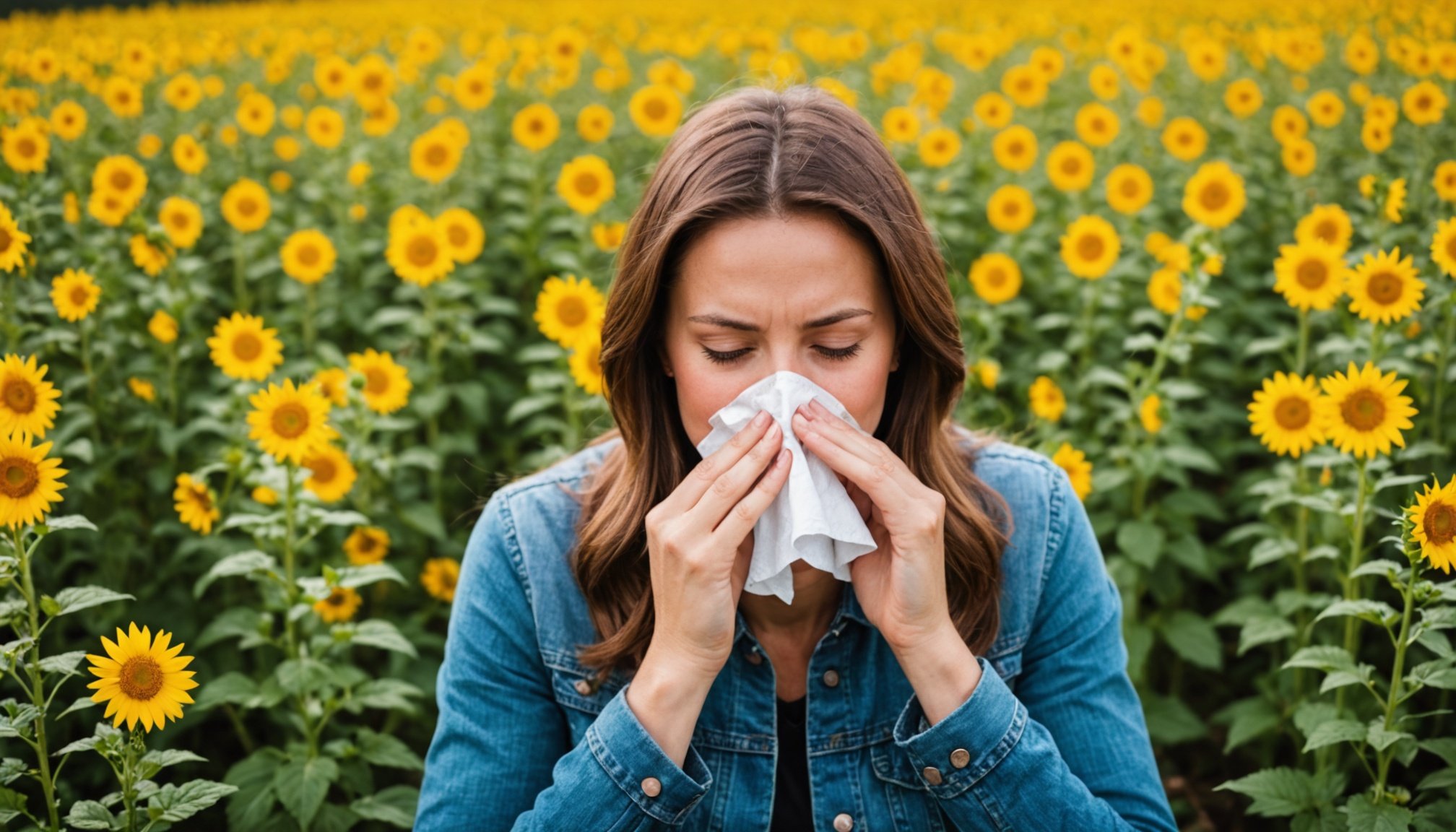Understanding Seasonal Allergies
Seasonal allergies, often referred to as hay fever or allergic rhinitis, affect many individuals worldwide. These allergies are primarily triggered by airborne substances such as pollen, dust mites, and mold spores. As certain plants release pollen at specific times of the year, seasonal allergies become more prevalent during these periods.
Typical symptoms of seasonal allergies include sneezing, runny or blocked nose, itchy eyes, and throat irritation. These reactions can significantly impact daily activities and quality of life. The body’s immune system mistakenly identifies harmless pollen as a threat and responds accordingly. When exposed to allergens, the immune response involves the release of histamines and other chemicals from mast cells in the nasal passages, leading to inflammation and classic symptoms of allergies.
Additional reading : Top Strategies for Supporting Cognitive Wellness in Older Adults: Best Practices for Healthy Aging
The intensity of these symptoms can vary depending on the individual’s sensitivity and the level of allergen present in the environment. Understanding the immune response can aid in managing these allergies more effectively. Identifying specific triggers through symptoms analysis can help tailor treatment approaches, such as antihistamines or avoiding allergen exposure, to alleviate discomfort and improve well-being. By analyzing symptoms, people can take proactive steps to manage their seasonal allergy challenges.
Home Remedies for Allergy Relief
When tackling allergies, many individuals find solace in home remedies. These alternatives can provide natural allergy relief and alleviate various symptoms associated with allergies.
Have you seen this : Top Strategies for Effectively Managing Chronic Fatigue Syndrome: A Comprehensive Guide
One common and effective method is the use of saline nasal rinses. This simple therapy helps clear nasal passages, reducing nasal congestion and improving breathing. It is considered safe for regular use and can be easily prepared at home with water and salt.
Next on the list are herbal teas and honey, both known for their soothing properties. Herbal teas like peppermint or ginger can ease throat irritation while providing additional health benefits. Honey, particularly local varieties, contains pollen which may gradually build immunity and reduce sensitivity to allergens.
Additionally, essential oils and aromatherapy provide holistic solutions. Oils such as eucalyptus or peppermint used in aromatherapy diffusers can clear sinuses and enhance relaxation. Diluted essential oils can also be applied topically for a more direct approach to alleviate symptoms.
These natural remedies offer a diverse array of benefits, often with fewer side effects than over-the-counter medications. However, while these alternatives can provide relief, it’s essential for individuals to consult with healthcare professionals, especially if they have severe allergies or are considering combining treatments.
Over-the-Counter Medications
When allergy season strikes, reaching for OTC Medications can provide much-needed relief. Understanding the various Allergy Treatments available helps in selecting the most effective option.
Types of Allergy Medications
Allergy medications generally fall into several categories. Antihistamines are among the most common, working by blocking histamines which cause symptoms like sneezing and itching. Decongestants focus on relieving a stuffy nose, often used in combination with antihistamines for comprehensive symptom relief.
Tips on Choosing the Right Medication
Selecting the best OTC medication depends on your specific symptoms. For immediate relief from itching and sneezing, antihistamines are an excellent choice. If nasal congestion is a primary complaint, look for a decongestant. For ongoing or severe symptoms, consider a combination therapy.
Potential Side Effects and Considerations
While OTC options are generally safe, they are not without potential side effects. Common antihistamines may cause drowsiness, affecting your ability to drive or operate machinery. Decongestants, on the other hand, can raise blood pressure, so it’s crucial for individuals with hypertension to consult a healthcare professional before use. Always consider existing health conditions and medication interactions when choosing an allergy treatment. By evaluating symptoms carefully, picking the right medication becomes straightforward, allowing for efficient and effective allergy management.
Lifestyle Changes to Manage Symptoms
Navigating the world of allergies can be overwhelming, but implementing lifestyle changes can make a significant difference in managing symptoms. To start, it’s crucial to minimise exposure to allergens within daily life. This means regularly cleaning spaces where dust accumulates and opting for furnishings that resist allergens.
Improving indoor air quality is a key factor in allergy management. One recommended approach is the use of HEPA filters, which effectively trap microscopic allergens like pollen, dust mites, and pet dander. Regularly replacing these filters ensures optimal performance. Additionally, a decluttered environment can prevent dust buildup, making your home a haven against allergens.
Diet also plays a notable role. Incorporating foods rich in vitamins and antioxidants can bolster the immune system, potentially reducing allergic reactions. Foods such as berries, citrus fruits, and leafy greens are not only nutritious but also supportive in allergy management.
While these lifestyle adjustments require commitment, understanding their potential benefits encourages informed decisions. By undertaking these changes, individuals can create a healthier, more comfortable living environment, significantly alleviating the discomfort associated with allergies.
Professional Treatment Options
When it comes to allergy treatments, professional options such as allergy shots and sublingual tablets offer promising paths. These methods often involve immunotherapy, a process aimed at increasing the body’s tolerance to specific allergens over time. But, how does this all work?
Immunotherapy involves introducing small, controlled amounts of an allergen into the body, gradually building the immune system’s tolerance. This long-term tolerance can significantly reduce reactions, providing relief for individuals with persistent allergies.
Allergy Shots
- Allergy shots, or subcutaneous immunotherapy (SCIT), are administered regularly over several years.
- They require commitment and regular visits to the healthcare provider.
Sublingual Tablets
- These tablets dissolve under the tongue and are typically taken at home, offering convenience.
The primary benefits of these treatments are a notable reduction in allergy symptoms and a decrease in the need for medications. However, it’s essential to consider potential drawbacks. This form of therapy requires long-term commitment, and not all allergies respond equally well.
Choosing the right option depends on individual needs, the specific allergens involved, and lifestyle factors. Consulting with an allergist is crucial to determining the most effective treatment plan.
FAQ: Common Concerns About Seasonal Allergies
Navigating seasonal allergies can sometimes be confusing, especially when symptoms mimic other conditions. Exploring the Allergy FAQs can help clarify several misunderstandings.
When should you see a doctor for allergy symptoms? If your symptoms persist despite over-the-counter treatments, it’s wise to consult a healthcare professional. This is particularly crucial if symptoms impact your daily life or lead to severe reactions like breathing difficulties. A doctor can offer precise allergy tests and tailored advice.
How do seasonal allergies differ from colds? Allergies often include itchy eyes, consistent sneezing, and last for weeks or months. Colds usually bring on symptoms like sore throat and fever and typically resolve within a week. Recognising these differences can help determine the right treatment approach.
Let’s talk about common myths about allergies. One prevalent myth is that moving to a new place can eliminate allergies. However, allergens exist everywhere, and new locales may just introduce new triggers. Another misconception is that allergies aren’t serious. In reality, untreated allergies can exacerbate other conditions, such as asthma.
Understanding these common questions about allergies enhances the ability to manage them effectively and ensure a better quality of life.











